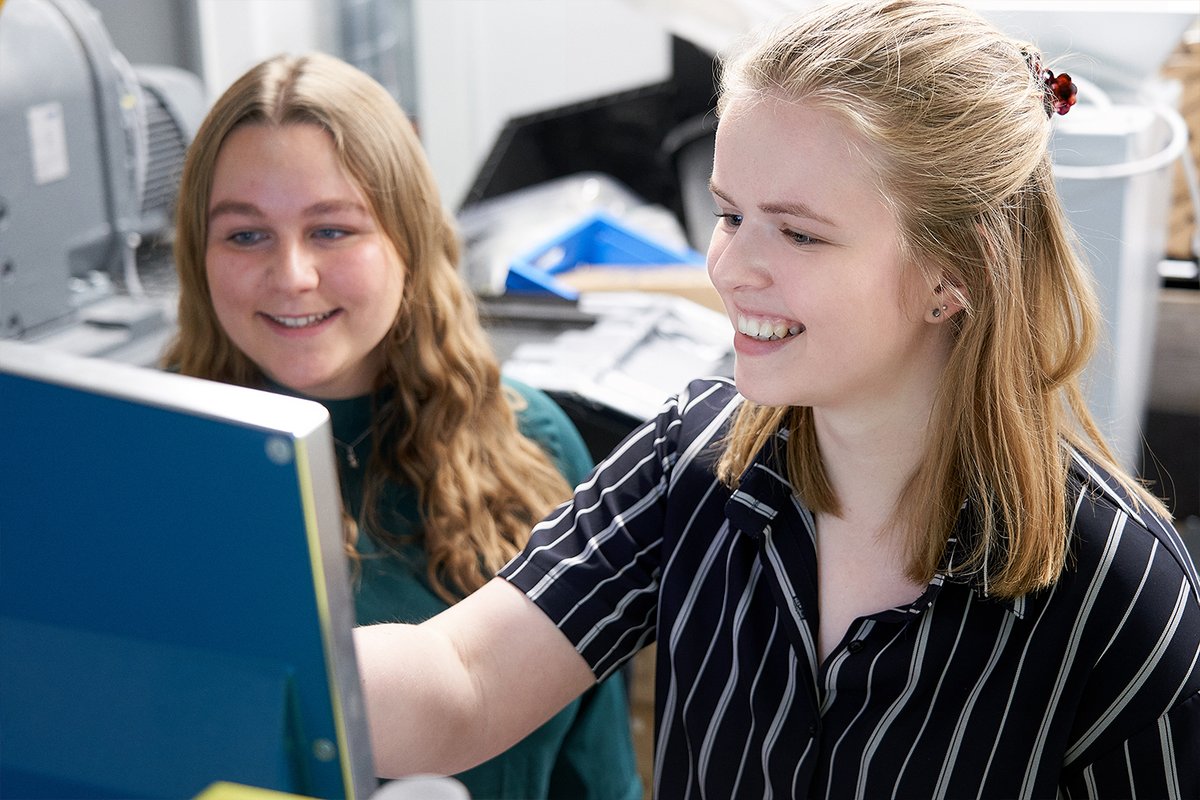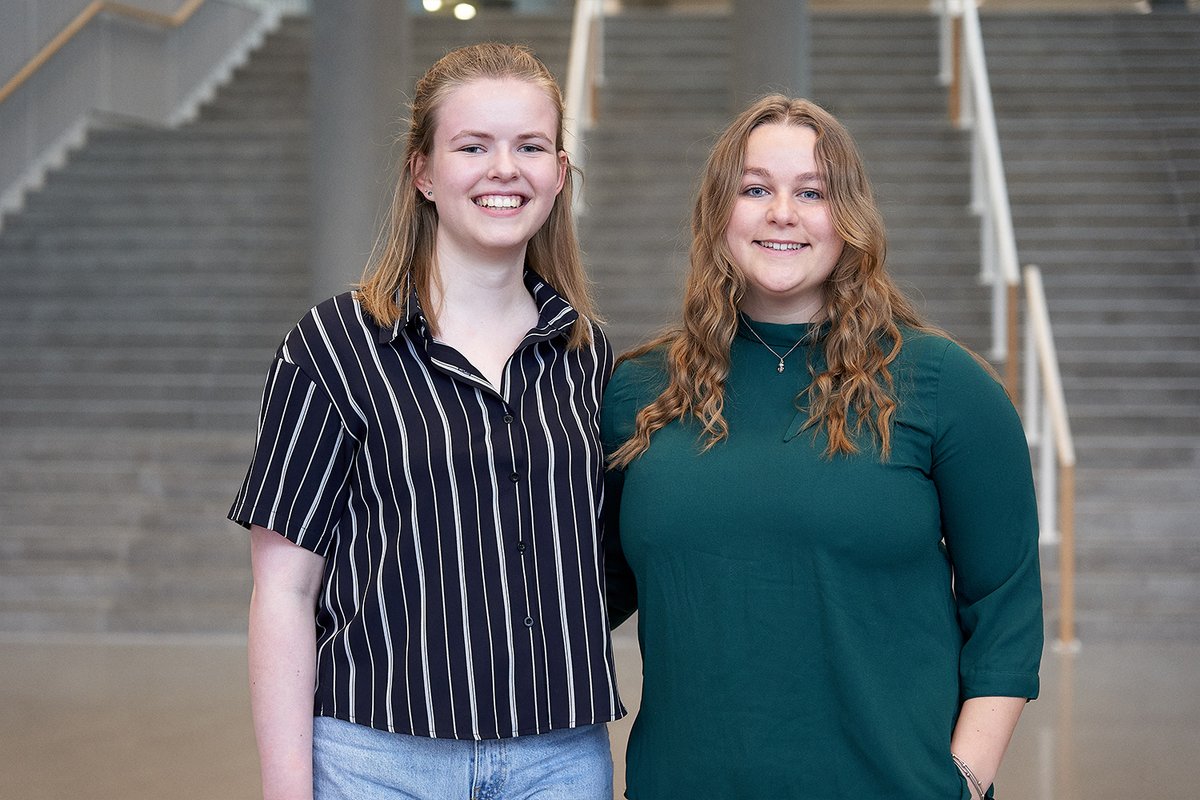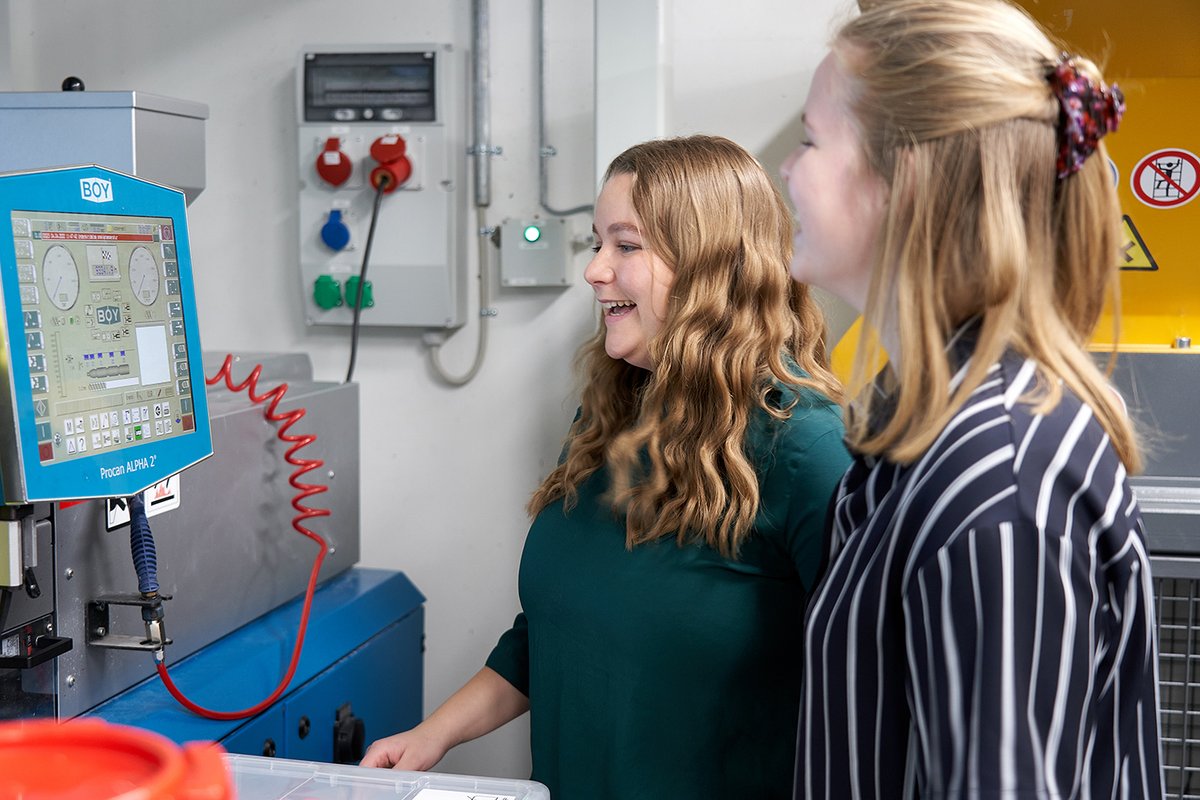
The vast majority of the plastics surrounding us, and that we use every day, are made of crude oil pumped from the ground. This is not sustainable, and neither is it climate-friendly or future-proof, and therefore researchers all over the world are looking for alternatives to plastics and trying to find better ways of recycling the plastic we have already manufactured.
Ultimately, most plastic ends up at an incineration facility, where the material is converted into energy. This is a rather inappropriate way of using the resource in a future circular society, when fossil raw materials will not be dug out of the ground because of climate and environmental considerations.
Two of those working on recycling plastics are 21-year-old Maja Hirschel Mikkelsen and 23-year-old Maja Rønn Østergaard. They are both on their 7th semester on the Mechanical Engineering programme at Aarhus University, and in their Bachelor's project, which they will complete in summer of 2022, they are trying to develop methods to improve possibilities to recycle polycarbonates; a group of very hard and impact-resistant plastics often used in electronics, 3D printing, building materials and as safety glass.
"Being able to recycle polycarbonates for industry is extremely relevant. Polycarbonates are made of long polymer chains that wind around each other in different constellations. These long chains give the material its properties, but they degrade over time. Due to sunlight, wind and weather, and through thermal degradation, the chains become shorter and shorter, so the material loses its strength. For this reason, in our project, we’re looking at what we can do to prolong the life expectancy and we’re examining the financial and climate aspects of recycling polycarbonates," says Maja Rønn Østergaard.
She is backed up by her fellow student:
"Polycarbonates are developed from crude oil. In a future without fossil raw materials, at some time we’ll run out of polycarbonates, unless we get better at recycling them. It’s therefore vital that we find out how to improve life expectancy and how we can recycle polycarbonates as much as possible," says Maja Hirschel Mikkelsen.
The two Maja’s are both interested in plastic as a material, as an environmental problem and as a challenge in a future sustainable society. Because plastic is very hard to do without in the modern world we have created. Their interest was aroused on their second semester on the mechanical engineering programme, when they both had a course in basic materials science.
"It was very exciting, and we had a fantastic teacher who was really enthusiastic about the subject. And there’s something very fundamental about working with a material like plastic, with all the negative and positive things people say about it.. Plastic is a huge environmental problem, and extracting the fossil raw materials from which plastics are made is also a huge climate problem. It’d be great if we could help make a difference here," says Maja Hirschel Mikkelsen.
The article continues below the image

Maja Rønn Østergaard says that she has wanted to study mechanical engineering ever since she was 16 at secondary school:
"I like to have a plan, and in the 8th grade you have to choose which high school (upper secondary school) you want to go to. I thought to myself that I couldn’t choose high school without knowing what I wanted to do afterwards, so I went to open-house events for a number of natural science and technical degree programmes, and mechanical engineering just caught my attention," she says.
Afterwards, she had two periods of study trials for the programme, one at the Technical University of Denmark (DTU) and one at Aarhus University, and after high school and an eighteen month gap, she decided on AU.
Maja Hirschel Mikkelsen chose the programme after a six-month stay at Rønde Folk High School, where she had elected a course in science and technology.
"We spent six months looking at how robots and other technology work, and I really liked the practical approach. I knew a lot about engineering as a subject because my dad is a chemical engineer, and as I wanted to work with technology in a broad context, I chose mechanical engineering. It’s nearly impossible to make the wrong choice with this programme, because there are so many career opportunities," she says.
She mentions that her father was pleased that she had chosen an engineering programme, but given his background, he had to ask whether she wouldn’t rather be a chemical engineer:
"I did actually consider it, because I was already interested in plastics, but I also knew that I could pursue that interest in mechanical engineering."
The article continues below the image

Maja and Maja both started their studies at the beginning of 2019. They were both aware that mechanical engineering is not the most attractive subject for women, but in fact there were more women on the programme than they expected. Their class had almost 10 per cent women, and if you ask why there are not more women on the course, they will both say in unison: "because of the name".
"I just think women are more likely to choose something other than a programme called mechanical engineering. That's a shame, because it's about much more than just machinery. We work with design and construction, thermodynamics, materials and robots; and with sustainable technical solutions to many different issues," says Maja Hirschel Mikkelsen.
The three-and-a-half-year Bachelor of Engineering programme includes a six-month internship, and it was a great experience for both Maja’s to get out and make their mark in the real world so early in a programme:
"You go out and you’re really nervous about whether you’ve got anything to contribute. But you have. Both academically, and because you’re used to working in teams from your studies. I did my internship at a ventilation company and I worked closely with the building management at the University Hospital in Skagen, with my project managers, and with a lot of others. It was great! I really enjoyed getting out and seeing that I actually can do something. That I'm ready for a job. I also found out that it’s OK if you aren’t perfect," says Maja Rønn Østergaard.
"And then it's great to get back on the programme again, because you've learned so much – practical and theoretical stuff, and stuff about yourself. You find out what you do and don’t want to work with. It's been so cool," says Maja Hirschel Mikkelsen.
"Yes, and it confirms that the programme also offers great opportunities to work with people," says Maja Rønn Østergaard, adding:
“There’s always a chance for collaboration and discussion. There are always other people working with you, and there’s ample opportunity to help other people. Mechanical engineers develop many things to help other people, such as health technology, and in this context you work a lot with end users, experts and in teams with other specialist groups. I think this is one of the things that really makes this course so exciting."